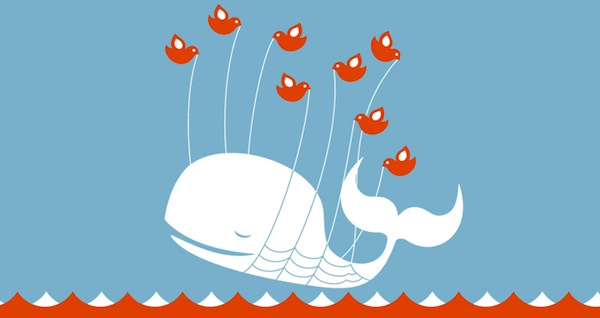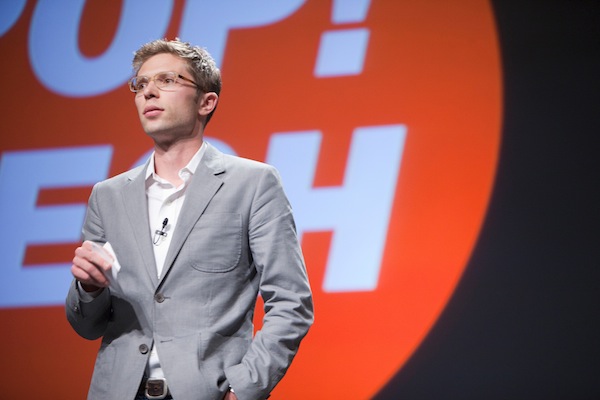

Twitter’s censorship snafu: The world’s been watching the Olympics this week, and the media world — especially in the U.S. — has been focused on NBC’s largely tape-delayed coverage of it. NBC’s tape-delay controversy (more on that later) spiraled into a much bigger issue when one of the most prominent critics of the network’s Olympics coverage, Guy Adams of Britain’s The Independent, had his account suspended from Twitter after he tweeted the business email address of an NBC executive.
The Independent published the email exchange Adams had with Twitter regarding the suspension, in which the company told him it had suspended his account for posting a “private email address.” Adams disagreed, saying the address was a corporate one available to anyone who knew how to use Google. Twitter restored Adams’ account the next day and published a blog post in which it confirmed that one of its employees had alerted NBC to Adams’ tweet, prompting NBC to file a formal complaint. Twitter apologized for doing that, saying it does not proactively monitor and flag content. BuzzFeed’s Matt Buchanan and GigaOM’s Mathew Ingram broke down Twitter’s post, emphasizing Twitter’s aversion to monitoring content itself and being seen as a publisher.
Danny Sullivan noted at Search Engine Land that the email address Adams tweeted wasn’t that easy to find on Google, and wrote on Marketing Land about the several celebrities who have tweeted private information and gotten away with it. Poynter’s Jeff Sonderman tracked the evolution of Twitter’s position regarding censorship, and Adams himself said he thought this type of censorship had ended with the Internet age.
Several observers expressed alarm at what this incident said about what Twitter’s becoming. Forbes’ Mark Gibbs called Twitter a “corporate stooge,” and his Forbes colleague Jeff Bercovici said Twitter is struggling with the task of building scale and ramping up its revenue, and GigaOM’s Mathew Ingram cautioned that Twitter must prioritize its network’s information value over its economic value. The Guardian’s Dan Gillmor said this could be a defining moment for Twitter, and Mat Honan of Wired urged Twitter to take this as seriously as if it were over an international political issue, rather than sports.
At Culture Digitally, Tarleton Gillespie provided a useful framework for understanding this issue, presenting Twitter’s possible free-speech obligations on a scale from totally private business to public trust. On one end of the spectrum, tech blogger Dave Winer wrote that “All this time the press has been acting as if Twitter were a public utility, when it is nothing like that. It’s a service operated for free by a private company.” Likewise, Forbes’ Michael Humphrey said we need to remember we’re just users of Twitter, while NBC is a partner.
On the other end, j-prof Jeff Jarvis said Twitter is fundamentally a platform rather than a business, and called for Twitter to build a wall between business interests and user trust. Similarly, Alexis Madrigal of The Atlantic warned Twitter, “You’re a real part of what it means to have free speech now, Twitter, and you better start acting like it.”

The Olympics and NBC’s news/entertainment tension: Now, to the issue that got Guy Adams so riled up at NBC in the first place: The network’s Olympics coverage, which tape-delayed most marquee events to maximize prime-time ratings, enraging some viewers (many of them on Twitter) who wanted to see events live. A Storify by Brandon Ballenger chronicled Twitter users’ many problems with NBC’s coverage, and The New York Times’ Richard Sandomir summarized the issue well: NBC’s online live streams, available only to cable subscribers, have been spotty, leading viewers to find alternative ways to access live coverage online.
Meanwhile, NBC’s TV broadcasts continue to pull in massive numbers of viewers, and GigaOM’s Stacey Higginbotham argued that live-streamers simply aren’t a large enough minority to put a dent in the existing TV model. Tech blogger Dave Winer said NBC looks at those users and sees not people, but hamsters and demographic categories, while TechCrunch’s Ryan Lawler argued that it wouldn’t hurt NBC to air big events both live and in prime time.
NBC Sports’ Mark Lazarus defended his network’s strategy to Sports Business Daily by arguing that “It’s not everyone’s inalienable right to get whatever they want,” and pointing out that NBC’s strategy revolves around creating “story arcs.” From a sports perspective, The Classical’s Eric Freeman said such a drama-oriented philosophy is cheapening the Olympics, while Will Leitch of Sports on Earth argued that it’s easy for Twitter users to forget that the way they consume media is not the way most people do.
Others argued that NBC’s plan was a loser from a media economics angle. J-prof Jeff Jarvis wrote that the media lesson here is that “business models built on imprisonment, on making us do what you want us to do because you give us no choice, is no strategy for the future.” At The Guardian, Heidi Moore argued that tying online streaming video to the cable-TV model is forcing users “to give CPR to a corpse.”
There were also defenses of NBC: Jaime Weinman of Maclean’s said that in a fragmented media world, it makes sense to do more, rather than less, to maximize viewership in prime time, and Jarvis noted that NBC’s big ratings indicate that people still value high-quality TV channels. And The Atlantic’s Megan Garber argued that in straddling the line between entertainment and information, NBC is merely facing a sharper version of the tension increasingly faced by much of the entertainment media industry.
 WikiLeaks’ hoax and online verification: As Julian Assange fights extradition to Sweden (which could lead to U.S. prosecution), his group, WikiLeaks, made headlines this week with convincing yet baffling hoax aimed at The New York Times and its former executive editor, Bill Keller. WikiLeaks posted a fake column purportedly by Keller on Sunday morning supporting WikiLeaks and alleging that financial companies had banned donations to WikiLeaks based on pressure from the U.S. government, then also created a fake Keller Twitter account and fake PayPal blog post to buttress its claims. In a Storify, Josh Stearns of Free Press detailed the detective work into the hoax and drew some lessons from it about information verification.
WikiLeaks’ hoax and online verification: As Julian Assange fights extradition to Sweden (which could lead to U.S. prosecution), his group, WikiLeaks, made headlines this week with convincing yet baffling hoax aimed at The New York Times and its former executive editor, Bill Keller. WikiLeaks posted a fake column purportedly by Keller on Sunday morning supporting WikiLeaks and alleging that financial companies had banned donations to WikiLeaks based on pressure from the U.S. government, then also created a fake Keller Twitter account and fake PayPal blog post to buttress its claims. In a Storify, Josh Stearns of Free Press detailed the detective work into the hoax and drew some lessons from it about information verification.
WikiLeaks acknowledged responsibility (along with “our great supporters”) for the hoax via Twitter, and afterward, Poynter’s Andrew Beaujon pointed out several of the giveaways. Keller was not amused, calling it a “childish prank” and “lame satire.” Many others lamented WikiLeaks’ thoughtlessness, including j-prof Jay Rosen, who wrote on Twitter that “Their ship was launched on the sea of verification. They just sunk it. For attention.” Fruzsina Eordogh of ReadWriteWeb said WikiLeaks’ critics missed the point — that the type of censorship directed at WikiLeaks could happen to the Times, too.
Poynter’s Craig Silverman said the WikiLeaks prank represents an emerging form of social hoax, while Glenn Greenwald of Salon argued that far from proving the unreliability of information online, the debunking process show how powerful the web’s collaborative verification process is. “It is true that the Internet can be used to disseminate falsehoods quickly,” he wrote, “but it just as quickly roots them out and exposes them in a way that the traditional model of journalism and its closed, insular, one-way form of communication could never do.”

Fabrication catches up with Jonah Lehrer: New Yorker writer Jonah Lehrer, who was caught re-using old material last month, was nailed for a much more serious offense this week when Tablet magazine’s Michael Moynihan wrote about his unsuccessful efforts to verify several of Lehrer’s quotes from Bob Dylan in his recent book Imagine. After the article was published, Lehrer resigned from The New Yorker, and his publisher pulled its copies of Imagine from the shelves and issued a note from Lehrer stating “The lies are over now.”
Andrew Beaujon and Steve Myers of Poynter did a thorough job of rounding up reactions to the episode in a series of posts, the highlights of which included former New York Times fabulist Jayson Blair’s comparison of Jonah Lehrer’s behavior with his own in articles at Salon and The Daily Beast, and incoming Times public editor Margaret Sullivan’s reflections on why talented writers resort to fabrication. The New York Observer also talked to Moynihan about story behind his exposé.
Salon’s Roxane Gay and The Atlantic’s Ta-Nehisi Coates tied Lehrer’s rise and fall to our society’s glamorization of young male genius and counterintuitive oracles, respectively. Columbia Journalism Review’s Curtis Brainard acknowledged both their arguments as legitimate, but said fabricators like Lehrer and Blair will always be anomalies. Alexis Madrigal of The Atlantic connected the Lehrer episode to our insatiable demand for making meaning from almost everything, even if it doesn’t really fit.
At The New York Observer, Paul Tullis defended Lehrer, saying his transgression wasn’t as serious as it’s being made out to be and he’s less a journalist than a “purveyor of ideas” — and therefore far superior to the likes of Blair. Meanwhile, Poynter’s Craig Silverman identified warning signs of a possibly plagiarizing or fabricating writer.
Reading roundup: The Olympics may have dominated most people’s attention, but there were plenty of other things going on this week:
— The New York Times reported that Apple has been discussing an investment in Twitter, while The Wall Street Journal reported that those talks were a year old and involved integrating Twitter into Apple’s mobile operating system. Mathew Ingram of GigaOM said investing in Twitter would make sense for Apple, but VentureBeat’s Matt Marshall, Fortune’s Philip Elmer-Dewitt, and Forbes’ Robert Hof all said it won’t happen.
— CNN president Jim Walton resigned last week, saying it was time for the network to get some new thinking. Salon’s Alex Pareene gave some ideas for a new direction, including experimenting with programming and going more international. The Guardian’s Michael Wolff looked at how CNN got to this point, and Jay Rosen explained why the status quo is so entrenched there.
— Soon after it was bought by Betaworks, the social-news site Digg relaunched this week. Greg Finn of Marketing Land declared it dead on arrival without user profiles or commenting, but GigaOM’s Mathew Ingram said it looks good — though the hard part is building a community around it. BetaBeat’s Jessica Roy, meanwhile, reported on Betaworks’ big-picture plans for Digg.
— In the wake of the New Orleans Times-Picayune’s announcement of severe cutbacks in its staff and publication, NPR and the University of New Orleans announced a new nonprofit news organization in New Orleans this week called NewOrleansReporter.org. The Wall Street Journal has the details, and Poynter has a good roundup, including the press release.
Photo of Jonah Lehrer by PopTech, photo of South Korean archers by Korea.net, and Assange caricature by Robert Cadena used under a Creative Commons license.